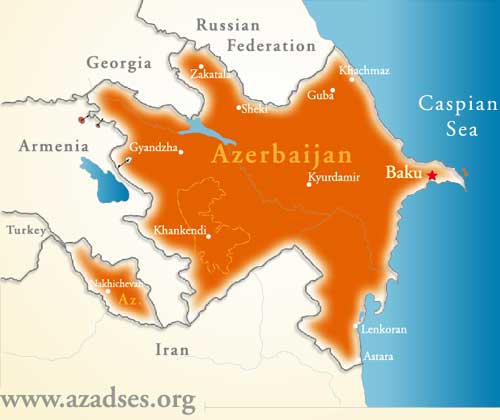Human Rights in an Azeri Way

Human Rights Defense Mechanisms Guaranteed by International Law does not Spread on Georgian Speaking Community of Azerbaijan – 83 Years of Discrimination, Silence and Indifference
Ethnic and Religious Discrimination in Azerbaijan, namely of the Georgians residing in districts of Zakatala (Zaqatala), Belakani and Kakhi has been going on for many years already. The government of the country is using detentions and other forms of pressure while forcing the Georgians, being in ethnic minority, to change religion, to forget their mother tongue, to refuse from Georgian surname and take Azeri ones; at the same time they are not allowed to give their children Georgian names. In the opinion of the residents of Zakatala (Zaqatala), Belakni and Kakhi Regions, the main reason of their restrictions by the government of Azerbaijan is to retain the territory of Saingilo which the Bolshevik Governmnet handed over to Azerbaijan in 1921 and they are trying to do so through making the Georgian population change religion and give up their national values as well as traditions. The set objective has almost been reached as there are only 3 Georgian villages left in Zakatala-Belakani. 11 villages with 140 000 Georgian residents were turned into Muslim religion there in the first half of the 20th century. Today the number of Georgians in this Region is not more than 12-13 thousand. The indifference and inaction of the Georgian government to the discrimination of the Georgian population of Azerbaijani despite the fact that the problem is well known to the Georgian side, is really surprising.
After giving the territory of Saingilo to Azrbaijan in 1921 it was in the agenda of the Azerbaijan Government to turn the Georgians living in Zakatala-Belakani and Kakhi Regions into Muslims as soon as possible. As it is known the most of the pressure was exercised on the Georgian population living in Zakatala –Belakani, which is the territory at the Georgian-Azerbaijan border. The set objective has almost been achieved; at present there are only 3 Georgian villages in Zakatala-Belakani.
The Georgian government possesses the information about the situation in which the Georgian families have had to live for years, but despite the fact the Georgian government is indifferent to the illegal actions implemented towards them and does not refer to any measures to defend the rights of the Georgian people. Representatives of the Georgian government have several times witnessed how Georgians are restricted in the Regions on ethnic and religious basis, they are forced to refuse from and forget their mother tongue, religion, to change Georgian surnames. However, the Georgian government does not react to these violations.
The Iashvilies’ family is one of the families which has been persecuted by the Azerbaijani government. Giorgi Iashvili, born in Azerbaijan was brought up in the family of Georgian traditions. Giorgi graduated from the Faculty of Law of Tbilisi State University. When being in his third year at University he got interested in the problem of discrimination of Georgians in Azerbaijan and began to study the issue and that did not remain unnoticed in Azerbaijan. Then the persecution and intimidation of him and his family started. Later warning tone of law enforcers increased into threats and raids were carried out on the Iashvilies’ family at nights. Law enforcers wanted to take Giorgi’s father as a hostage. Namely, they offered the Iashvilies the deal according to which they would detain the Head of the family and keep him in the police station until his son returned and then they would change the “hostage” and the son would go into prison instead of the father. The Iashvilies’ family could not endure more and Giorgi’s father concealingly left for Moscow and Giorgi’s mother, sister and little brother stayed in Azerbaijan. The pressure was still exercised on them but not as in the case of the men. Giorgi arrived in Georgia. It has already been 3 years that he has not seen his relatives. He is declared wanted in Azerbaijan. The accusation why he is declared wanted is that he has not gone to military service, though at the time when Giorgi went to Tbilisi Ivane Djavakhishvili State Univeristy there was the Military Department in the University and so Giorgi was freed from military service.
The term “Ingilo” was born at the end of 17th and beginning of 18th century. This is the period when Georgians were made to adopt Muslim religion and that’s where the term is coming from; in old Turkish the term “Ingilo” meant a person who adopted a new religion. People lost their religion but they always wanted to return to it. After the collapse of the Soviet Union that Azerbaijan became independent, the Geogrian who were made to adopt Muslim religion wanted to return to Christianity. The only church, Church of Virgin Merry which was built in the 16th century by King Levan, was exploded on August 3, 1971 by one of the official’s order. There is not even one church in Zakatala-Belakani.
The Goergians who have had the courage to return to Christianity are under constant persecution and pressure. They are freed from military service and are very often the victims of aggression and terror by the side of the police. Hundreds of people do not have the possibility to gain back his/her surname or to give a Georgian name to a newly born child. Any of this kind of attempt is finished with terror and new wave of pressure on the Georgian population.
The Georgians living in Azerbaijan have the same constitutional rights as the Azeri population, which is supported by international legal norms. But the Azerbaijan government, in spite of being affiliated in the Council of Europe neglects the international norms towards the Georgian population. In the meantime the 84th year of silence, indifference and discrimination has started.
Nino Bestavashvili
Nana Naskidashvili



